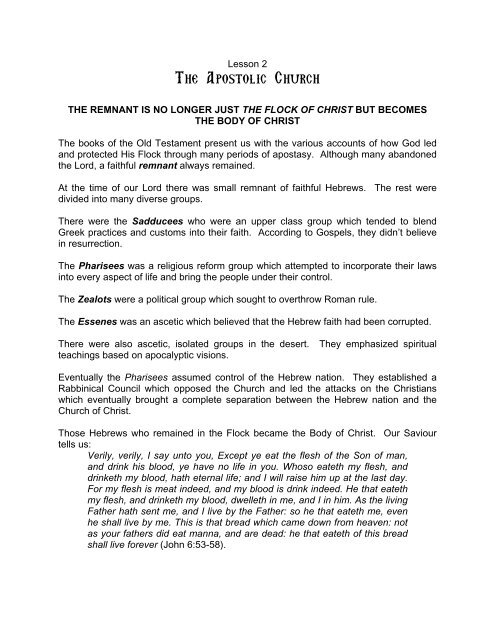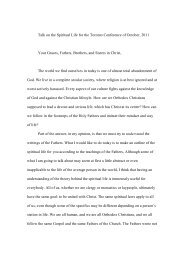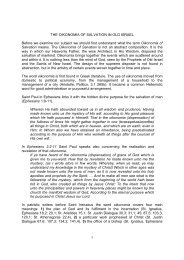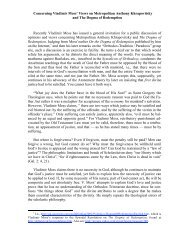The Apostolic Church by Fr. Panagiotes Carras - Saint Nektarios ...
The Apostolic Church by Fr. Panagiotes Carras - Saint Nektarios ...
The Apostolic Church by Fr. Panagiotes Carras - Saint Nektarios ...
Create successful ePaper yourself
Turn your PDF publications into a flip-book with our unique Google optimized e-Paper software.
Lesson 2<strong>The</strong> <strong>Apostolic</strong> <strong>Church</strong>THE REMNANT IS NO LONGER JUST THE FLOCK OF CHRIST BUT BECOMESTHE BODY OF CHRIST<strong>The</strong> books of the Old Testament present us with the various accounts of how God ledand protected His Flock through many periods of apostasy. Although many abandonedthe Lord, a faithful remnant always remained.At the time of our Lord there was small remnant of faithful Hebrews. <strong>The</strong> rest weredivided into many diverse groups.<strong>The</strong>re were the Sadducees who were an upper class group which tended to blendGreek practices and customs into their faith. According to Gospels, they didn’t believein resurrection.<strong>The</strong> Pharisees was a religious reform group which attempted to incorporate their lawsinto every aspect of life and bring the people under their control.<strong>The</strong> Zealots were a political group which sought to overthrow Roman rule.<strong>The</strong> Essenes was an ascetic which believed that the Hebrew faith had been corrupted.<strong>The</strong>re were also ascetic, isolated groups in the desert. <strong>The</strong>y emphasized spiritualteachings based on apocalyptic visions.Eventually the Pharisees assumed control of the Hebrew nation. <strong>The</strong>y established aRabbinical Council which opposed the <strong>Church</strong> and led the attacks on the Christianswhich eventually brought a complete separation between the Hebrew nation and the<strong>Church</strong> of Christ.Those Hebrews who remained in the Flock became the Body of Christ. Our Saviourtells us:Verily, verily, I say unto you, Except ye eat the flesh of the Son of man,and drink his blood, ye have no life in you. Whoso eateth my flesh, anddrinketh my blood, hath eternal life; and I will raise him up at the last day.For my flesh is meat indeed, and my blood is drink indeed. He that eatethmy flesh, and drinketh my blood, dwelleth in me, and I in him. As the livingFather hath sent me, and I live <strong>by</strong> the Father: so he that eateth me, evenhe shall live <strong>by</strong> me. This is that bread which came down from heaven: notas your fathers did eat manna, and are dead: he that eateth of this breadshall live forever (John 6:53-58).
In Holy Communion we partake of Christ's Body and Blood, there<strong>by</strong> uniting ourselves toChrist. In Baptism our rebirth and our re-creation begins:Verily, verily, I say unto thee, Except a man be born of water and of theSpirit, he cannot enter into the kingdom of God. That which is born of theflesh is flesh; and that which is born of the Spirit is spirit. (John 3:5-6)<strong>Saint</strong> Athanasius tells us that Christ is the principle of new life. In the Incarnation thereis a new creation, the resurrected body of Christ becomes the origin of incorruptibilityand life for all creation. He says: <strong>The</strong> Word was made a bearer of flesh, that men mightbecome bearers of the Spirit.Baptism is birth into the Body of Christ, the <strong>Church</strong>; the saving action of God whothrough water and the Spirit recreates his creation; the initial Mystery through which hewho is immersed in water three times in the name of the Father and of the Son and ofthe Holy Spirit is cleansed from all sin and reborn.Those who are separated from Christ's Body, however, cannot receive Grace, just as anarm separated from a human body cannot receive the nourishment of blood andnutrients necessary for life. Without being a member of Christ’s body we can not growin Christ. With Baptism our new life in Christ begins. <strong>The</strong> Epistles of <strong>Saint</strong> Paul havemuch to teach us about growth in the Body of Christ:Christ is the head of the church: and He is the Saviour of the body(Ephesians, 5:23).For as the body is one, and hath many members, and all the members ofthat one body, being many, are one body: so also is Christ. For <strong>by</strong> oneSpirit are we all baptized into one body, whether we be Jews or Gentiles,whether we be bond or free; and have been all made to drink into oneSpirit (I Corinthians, 12:12-13)We, being many, are one body in Christ, and every one members one ofanother (Romans, 12:5).With the Fullness of the Grace of the Holy Spirit which the Flock of Christ received atHoly Pentecost the small remnant was sent out into the world. Go ye therefore, andteach all nations, baptizing them in the name of the Father, and of the Son, and of theHoly Ghost: Teaching them to observe all things whatsoever I have commanded you:and, lo, I am with you alway, even unto the end of the world (Matthew 28,19-20).<strong>The</strong> <strong>Apostolic</strong> period extends from the Day of Pentecost to the repose of St. John, andcovers about seventy years, from a.d. 30 to 100. <strong>The</strong> <strong>Church</strong> was originally centered inPalestine, and gradually extended over Syria, Asia Minor, Egypt, India, Greece, Italy,Spain, England. <strong>The</strong> most prominent centres were Jerusalem, Antioch, and Rome.Next to them were Ephesus, <strong>The</strong>ssaloniki and Corinth. Ephesus acquired a specialimportance <strong>by</strong> the residence and labors of St. John and the <strong>The</strong>otokos. Samaria,Damascus, Joppa, Caesarea, Tyre, Cyprus, the provinces of Asia Minor, Troas, Philippi,Beraea, Athens, Crete, Patmos, Malta, come also into view as points where the
Christian faith was planted. As early as a.d. 58 St. Paul could say: <strong>Fr</strong>om Jerusalemand round about even unto Illyricum, I have fully preached the gospel of Christ (Rom.15:19). He afterwards carried it to Rome, where it had already been known before, andas far as Spain, the western boundary of the empire.<strong>The</strong> nationalities reached <strong>by</strong> the Gospel in the first century were the Jews, the Greeks,and the Romans, and the languages used were the Hebrew or Aramaic, and especiallythe Greek, which was at that time the organ of civilization and of internationalintercourse within the Roman empire.St. Luke in the Book of Acts records the heroic march of Christianity from the capital ofJudaism to the capital of heathenism with the same artless simplicity and serene faithas the Evangelists tell the story of Jesus; well knowing that it needs no embellishment,no apology, no subjective reflections, and that it will surely triumph <strong>by</strong> its inherentspiritual power.<strong>The</strong> Acts and the Epistles of St. Paul accompany us with reliable information down tothe year 63. A few years afterwards followed the destruction of Jerusalem, which musthave made an overpowering impression and broken the last ties which bound JewishChristianity to the Jewish nation. <strong>The</strong> event is indeed brought before us in the prophecyof our Saviour as recorded in the Gospels, but for the terrible fulfillment we aredependent on the account of Josephus, an unbelieving Jew, which, as the testimony ofan enemy, is all the more impressive.At the time of the conversion of Constantine, in the beginning of the fourth century, thenumber of Christians may have reached ten or twelve millions, that is about one-tenth ofthe total population of the Roman Empire. <strong>The</strong> rapid growth of the <strong>Church</strong> under themost unfavorable circumstances was miraculous. It was achieved in the face of anindifferent or hostile world, and <strong>by</strong> purely spiritual and moral means, without shedding adrop of blood except that of its own innocent martyrs.Signs and wonders and extraordinary demonstrations of the Grace of the Holy Spirit, forthe conversion of unbelieving Jews and heathens, attended the entrance of the <strong>Church</strong>into the pagan world. It took up its permanent abode with our fallen race, to transform itgradually, without war or bloodshed, <strong>by</strong> a quiet, leaven-like process, into the People ofGod. Modest and humble, lowly and unseemly in outward appearance, without silver orgold, but rich in gifts of the Holy Spirit, strong in faith, fervent in love, and joyful in hope;bearing in earthen vessels the imperishable treasures of heaven, it presented itself to allthe nations of the earth as the only road to the Kingdom of God. At first an insignificantand even contemptible sect in the eyes of the carnal mind, hated and persecuted <strong>by</strong>Jews and heathens, the Faith of the Christians confounded the wisdom of Greece andthe power of Rome, soon planted the standard of the Holy Cross in the great cities ofAsia, Africa, and Europe, and proved itself the hope of the world.<strong>Saint</strong>s Peter, Paul, and John stand out most prominently as the chosen Three whoaccomplished the great work of the <strong>Apostolic</strong> Age, and exerted, <strong>by</strong> their writings and
example, a controlling influence on all subsequent ages. To them correspond threecentres of influence, Jerusalem, Antioch, and Rome.Our Lord himself had chosen Three out of the Twelve for his most intimate companions,who alone witnessed the Transfiguration and the agony in Gethsemane. <strong>The</strong>se <strong>Saint</strong>sbecame pillars of the <strong>Apostolic</strong> <strong>Church</strong>; <strong>Saint</strong>s Peter and John <strong>by</strong> their long andsuccessful labors, <strong>Saint</strong> James the brother of the Lord <strong>by</strong> drinking early the bitter cup ofhis Master, as the proto-martyr of the Twelve.<strong>Saint</strong> Paul was called last and out of the regular order, <strong>by</strong> the personal appearance ofthe exalted Lord from heaven, and in authority and importance he was equal to any ofthe three pillars, but filled a place of his own, as the Apostle of the Gentiles. He hadaround him a small band of co-laborers and pupils, such as <strong>Saint</strong>s Barnabas, Silas,Titus, Timothy, Luke.Nine of the original Twelve, including Matthias, who was chosen in the place of Judas,labored faithfully and effectively, in preaching the gospel throughout the Roman empireand to the borders of the barbarians.<strong>The</strong> labors of <strong>Saint</strong>s James and Peter we can follow in the Acts to the Council ofJerusalem, a.d. 50, and a little beyond; those of <strong>Saint</strong> Paul to his first imprisonment inRome, a.d. 61–63; <strong>Saint</strong> John lived to the close of the first century. As to their lastlabors we have no authentic information in the New Testament, but the unanimoustestimony of Holy Tradition that <strong>Saint</strong>s Peter and Paul suffered martyrdom in Romeduring or after the Neronian persecution, and that <strong>Saint</strong> John reposed at Ephesus. <strong>The</strong>Acts breaks off abruptly with <strong>Saint</strong> Paul still living and working, a prisoner in Rome,preaching the kingdom of God and teaching the things concerning the Lord JesusChrist, with all boldness, none forbidding him. A significant conclusion.





